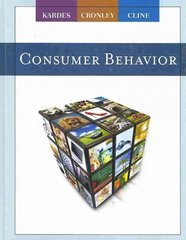How would you protect consumers from subliminal self-help CDs that dont work? Imagine that you work for
Question:
How would you protect consumers from subliminal self-help CDs that don’t work?
Imagine that you work for the Consumers Union, the consumer protection organization that publishes Consumer Reports. Your supervisor asked you to test the effectiveness of several subliminal self-help CDs that are currently on the market. Before designing your experiment, you performed a literature review and found a classic experiment on the effectiveness of subliminal self-help audiotapes. Students were randomly assigned to conditions in a 2 x 2 factorial design in which expectations and audiotape contents were manipulated experimentally. Half the students were told that the audiotape improved memory performance. The other half were told that the audiotape improved self-esteem.
Half of the students received the memory audiotape, and half received the self-esteem audiotape, regardless of what they were told earlier. Hence, in half of the conditions, expectations and content matched (e.g., students expected the audiotape to improve memory and the audiotape was supposed to actually improve memory). For the remaining half, expectations and content were mismatched (e.g., students expected the audiotape to improve memory, but the audiotape was supposed to actually improve self-esteem). The results showed that expectations influenced memory performance and self-esteem ratings and that the content of the audiotapes had no effect. Imagine that you conducted a replication experiment using currently available subliminal self-help CDs and that you obtained the same pattern of results.
Step by Step Answer:

Consumer Behavior
ISBN: 9780538745406
1st Edition
Authors: Frank Kardes, Maria Cronley, Thomas Cline





